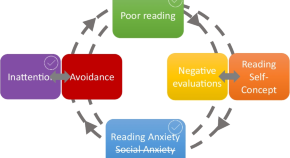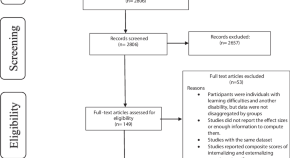Collection
Dyslexia and Mental Health Problems
- Submission status
- Closed
Mental health is recognized as one of the biggest problems in schools today. It has been estimated that one in five school-aged youth (ages 4 to 19) experiences mental health problems (Kessler et al., 2005) with the risk being higher among children with learning disorders such as dyslexia (Francis et al., 2019; McArthur et al., 2020). Nevertheless, a closer look at the literature on mental health problems and dyslexia reveals mixed findings. Whereas some studies have shown that individuals with dyslexia experience higher rates of anxiety, depression and/or learned helplessness (e.g., Goldston et al., 2007; Heiervang et al., 2001; Ihbour et al., 2021), others have reported no significant effect of dyslexia on the prevalence of mental health problems (e.g., Mattek & Wierzbicki, 1998; Miller et al., 2005; Riddick et al., 1999). In addition, little is known about effective interventions of mental health problems in dyslexia or about resilience factors that may protect individuals with dyslexia against mental health problems. Thus, the purpose of this special issue is to increase our understanding around mental health problems in dyslexia.
Editors
-
George Georgiou
George Georgiou is a full professor in the Faculty of Education at the University of Alberta and an adjunct professor at Beijing Normal University and the University of Cyprus. His research focuses on the prevention and remediation of reading difficulties with an eye on how we can optimize teachers’ knowledge of evidence-based practices in early literacy. In the last two years he was seconded to Alberta Education to oversee the development and implementation of the new English Language Arts curriculum in the province.
-
Rauno Parrila
Professor Rauno Parrila is the Director of Australian Centre for the Advancement of Literacy at the Australian Catholic University. His research focuses on psychological, linguistic, and social correlates of both typical and atypical development of reading and academic achievement. He received his Ph.D. in 1996 from University of Alberta, Canada, and has since worked in different universities in Norway, Canada, and Australia. He is a docent in Applied Cognitive Psychology in Department of Psychology at the University of Jyväskylä, Finland, and former the Editor-in-Chief of Scientific Studies of Reading.
-
Genevieve McArthur
Genevieve McArthur is a Professor in the Australian Centre for the Advancement of Literacy, and Director of Research Translation at the Dyslexia SPELD Foundation. The goal of these joint appointments is to help accelerate the translation of rigorous reading science into advanced reading practice in Australia. She leads a research group that investigates the relationship between poor reading (PR) and anxiety (+AX = PRAX). She is also interested in the direct and indirect impacts of shared book reading, and improving the efficiency of assessments and intervention for developmental dyslexia.
Articles (8 in this collection)
-
-
Understanding the relation between reading and anxiety among upper elementary students with reading difficulties
Authors (first, second and last of 6)
- Sarah Fishstrom
- Philip Capin
- Sharon Vaughn
- Content type: OriginalPaper
- Published: 16 January 2024
- Pages: 123 - 141
-
Mental health among children with and without reading difficulties
Authors (first, second and last of 5)
- Miao Li
- Wei Zhao
- Gen Li
- Content type: OriginalPaper
- Published: 29 December 2023
- Pages: 27 - 46

-
Are comorbidities of poor reading related to elevated anxiety in children?
Authors (first, second and last of 5)
- Genevieve McArthur
- Amy Doust
- Saskia Kohnen
- Content type: OriginalPaper
- Published: 22 December 2023
- Pages: 47 - 65

-
Internalizing problems in individuals with reading, mathematics and unspecified learning difficulties: a systematic review and meta-analysis
Authors (first, second and last of 7)
- Ana Paula Alves Vieira
- Peng Peng
- George Georgiou
- Content type: OriginalPaper
- Published: 22 December 2023
- Pages: 4 - 26

-
Anxiety and coping strategies among dyslexics in Ethiopia
Authors
- Abebayehu Messele Mekonnen
- Linda Visser
- Janin Brandenburg
- Content type: OriginalPaper
- Published: 27 November 2023
- Pages: 66 - 81
-
Are children with early literacy difficulties at risk for anxiety disorders in late childhood?
Authors
- Apostolos Kargiotidis
- George Manolitsis
- Content type: OriginalPaper
- Open Access
- Published: 08 November 2023
- Pages: 82 - 96
-
Predicting adult-age mental health with childhood reading and math disability: do resilience and coping styles matter?
Authors
- Tuija Aro
- Ahmet Bilal Özbek
- Minna Torppa
- Content type: OriginalPaper
- Open Access
- Published: 25 October 2023
- Pages: 97 - 122




